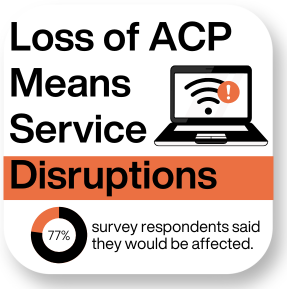

Survey Highlights
- Highlight 1: More than three-quarters (77%) of the survey respondents say losing their ACP benefit would disrupt their service by making them change their plan or drop internet service entirely.1
- Highlight 2: About half of survey respondents (47%) reported having either no internet service or relying solely on mobile internet service prior to receiving their ACP benefit. The same is true for rural respondents (53%).2
- Highlight 3: Over two-thirds of survey respondents (68%) reported they had inconsistent internet service or no internet service at all prior to ACP. The majority of this group cited affordability as the reason for having inconsistent or no service (80%).3
- Highlight 4: ACP subscribers reported that they use their ACP internet service to: schedule or attend healthcare appointments (72%), apply for jobs or complete work (48%), do schoolwork (75% for ACP subscribers 18-24 years old).4
1 Highlight 1 Precise Result: 76.9%, +/- 1.1%
2 Highlight 2 Precise Result: 47.1%, +/- 1.3% for all respondents and 52.7%, +/- 3.4% for rural respondents
3 Highlight 3 Precise Result: 67.5%, +/-1.3% and 80.3%, +/- 1.3% of this group cite affordability
4 Highlight 4 Precise Result: 71.8%, +/- 1.2% for healthcare, 48.0%, +/-1.4% for jobs, 74.9% +/-8.9% for schoolwork for ACP subscribers aged 18-24
Survey Overview
In December 2023, the FCC conducted a survey of ACP recipients to enhance our understanding of the program's impact and how the end of the program may impact access to broadband services. Survey respondents were also given the opportunity to submit written responses to our questions about how losing ACP support would impact them.

Many said they would "take money from other bills" or "cut other basic expenses," like food or gas, if "their monthly internet bill were $30 higher."
Many other respondents said they would "go without" internet or that they would have to "drop the service."
Survey Questions & Results
- Measuring Impact Survey Fact Sheet [PDF]
- Full Survey [PDF]
Survey Methodology
FCC staff created a stratification methodology based on demographic characteristics of interest to ensure the sample was representative of the entire ACP population. USAC randomly selected two independent samples and sent emails to 110,000 ACP households between 12/12/2023 and 12/14/2023.
A total of 5,317 ACP households, or 4.8%, submitted a response. This response rate is consistent with other surveys sent through email and, with appropriate weighting, allows us to create a statistically valid sample. Upon receiving the final responses, strata with low response-rates were collapsed and survey weights adjusted for non-response were calculated and applied.